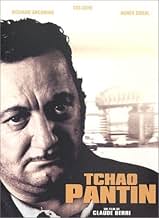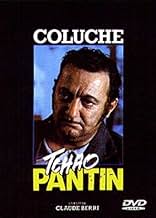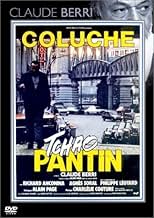Tchao pantin
- 1983
- Tous publics
- 1h 34min
NOTE IMDb
7,3/10
3,3 k
MA NOTE
Lambert travaille de nuit dans une station-service de Paris. Âgé, solitaire, taciturne, alcoolique, il rencontre Youssef, un jeune petit délinquant sympathique. Bien qu'ils n'aient rien en c... Tout lireLambert travaille de nuit dans une station-service de Paris. Âgé, solitaire, taciturne, alcoolique, il rencontre Youssef, un jeune petit délinquant sympathique. Bien qu'ils n'aient rien en commun, ils deviennent amis.Lambert travaille de nuit dans une station-service de Paris. Âgé, solitaire, taciturne, alcoolique, il rencontre Youssef, un jeune petit délinquant sympathique. Bien qu'ils n'aient rien en commun, ils deviennent amis.
- Récompenses
- 5 victoires et 7 nominations au total
Agnès Soral
- Lola
- (as Agnes Soral)
Philippe Léotard
- Bauer
- (as Philippe Leotard)
Mohamed Ben Smaïl
- Mahmoud
- (as Ben Smail)
Mickaël Pichet
- Mickey
- (as Mickael Paul)
Vincent Michel Paul Filliatre
- Momo
- (as Michel Paul)
Histoire
Le saviez-vous
- AnecdotesThe title "Tchao, Pantin" became a very well-known expression in France to define a comedian's spectacular dramatic breakthrough, in reference to Coluche who only starred in comedies prior to the film and earned the César for his performance. The term can also be used in a derogatory way when a comedian's dramatic film fails to achieve the same success and then gets dismissed as a wannabe "Tchao pantin".
- ConnexionsFeatured in Un jour, un destin: La face cachée de Coluche (2008)
- Bandes originalesLes Nuits sont trop Longues
Music by Charlélie Couture
Lyrics by Charlélie Couture
Performed by Charlélie Couture
Commentaire à la une
Coluche's acting in "Tchao Pantin", or "So Long, Stooge" was so pivotal in the film's success that the title became a well-known trope defining a comedian's dramatic breakthrough. Coluche became an actor's school-case firmly establishing what his stand-up routines made attentive eyes suspect: he was more than a clown. And as pump attendant Lambert, he let his proletarian roots and street-smart humanity operate as naturally and poignantly as if he'd played these roles for twenty years. He was only 39 but could look ten years older with these eyes that always seem at loss and a heart that whatever used to drive it probably stopped to exist. What an irony for a man who literally 'fuel' people to be trapped in such a desperately static life.
Lambert is a total mystery but not in the way 'mystery' can be used to trick viewers, the directing of Claude Berri doesn't care for effects or twists, that's why saying the revelations that come near the end were predictable is missing the film's point. The story couldn't have been more linear and straightforward; whether it's a deliberate stylistic approach or not, Berri cares more for his characters who have all in common a sort of entrapment in a condition whose gravity isn't valued until violence raises its ugly head. It's a bit like staggering down the same disreputable and dangerous street every night to go home knowing that one night, you'll have pushed your luck one time too many. Nothing can come good from these dark and deserted streets sublimated by Bruno Nyutten's cinematography, as inky and shadowy as Gordon Willis' closed-doors shot in "The Godfather".
Indeed, in this masterpiece of sobriety, it's literally to the French hearts of darkness that we're plunged, in a journey that never surrenders to cheap emotions, you'll never see a tear running on Coluche's cheek or his brief friendship with Bensoussan starting with predictable antagonism, sometimes the best about human relationships is as hazardous as casual as the worst and maybe this is where the poignancy lies. Many things happen but we never take then for bad luck, they seem to be dictated by a Karma, a sort of immanent presence that decided the likes of Bensoussan, a small-time drug-trafficker, are the kind of natural outcasts who won't find their place no matter how hard they try. As the half-Arab, half-Jewish thug, Anconina gives one of his greatest performances, he's a man lacking the social skills because he obviously lacked something in his life, whatever it was, he found a parcel of it in Lambert's empathy.
Their interaction builds the whole first act and the dialogue is powerful without trying, when they talk, you can hear the hidden messages, the performances make you grasp the unspoken truths about their lives and it's so subtly done that you know the journey won't end with a happy ending. The rest of the cast involves a worn-down cop played by droopy-eyed Philippe Léotard and a punk prostitute played by Agnes Soral, needless to say that these characters aren't archetypes in the strictest sense of the word. Bensoussan sees Lola as the pretty blonde and the perfect trophy girlfriend, to bang and brag about it the day after, while Bauer first strikes as a little pebble in the shoe until he reveals, like Lola, more complexity. Society makes archetypes, not movies, and this is what "So Long, Stooge" is about, going into the depths of natural misfits in the crisis-stricken France of the early 80's.
Because "So Long, Stooge" is also a powerful time capsule of the dark and shady France, sung by Renaud or drawn by comic-book artist Frank Margerin, it's a universe made of black leather jackets, motorbikes and guns, without the romantic and rebellious spirit of the 50's, more of the disillusioned post-Oil crisis days we'd find in Kassovitz "Hatred". But even as a product of its era, the film resists the test of time because it's a vivid, lucid and poignant friendship story and an unforgettable descent into the soul of a man whose greatest revelation doesn't involve his past, but just the fact that, despite the shocking factor, he's just a nice guy. To a certain degree, Lambert is perhaps the closest French character to Travis Bickle and he's certainly not a pale copy, Coluche would win the French Oscar for his performance.
Sadly enough, he wouldn't have time to prove his value again as he'd die in a tragic motorbike accident in 1986, giving an eerie dimension to one of the most tragic moments in the film. Coluche like Bourvil didn't have time to be a late bloomer on the field of drama and left one of the most memorable performances of French cinema. And yes, it was so good "Tchao Pantin" isn't just used to describe the turning point of comedians but also their Holy Grail, their hidden desperation to be taken seriously at least once, Jean Dujardin, José Garcia or Franck Dubosc all wait for their "Tchao Pantin". Well, in 1983, Yannick Noah was the last French tennis player to win Roland Garros and Coluche the last comedian to have transitioned successfully to drama. Maybe today's cinema tends to overplay emotion, to emphasize the sleaziest aspects of the story such as gore and sex, while "So Long, Stooge" has its share of graphic moments, it's only in the peaceful and serene moments that we can measure what a tragic loss for cinema Coluche was.
And you can see in "So Long, Stooge" a rebirth of a grittier and more realistic form of filmmaking that had also one merit, to take Franch cinema out of that 'New Wave' rut and start to reflect its time and tell compelling stories that don't just rely on existential torments, but on actions, too, paving the way to the new generation: from Luc Besson to jean-Jacques Beineix. Definitely one of French cinema's most relevant movies.
Lambert is a total mystery but not in the way 'mystery' can be used to trick viewers, the directing of Claude Berri doesn't care for effects or twists, that's why saying the revelations that come near the end were predictable is missing the film's point. The story couldn't have been more linear and straightforward; whether it's a deliberate stylistic approach or not, Berri cares more for his characters who have all in common a sort of entrapment in a condition whose gravity isn't valued until violence raises its ugly head. It's a bit like staggering down the same disreputable and dangerous street every night to go home knowing that one night, you'll have pushed your luck one time too many. Nothing can come good from these dark and deserted streets sublimated by Bruno Nyutten's cinematography, as inky and shadowy as Gordon Willis' closed-doors shot in "The Godfather".
Indeed, in this masterpiece of sobriety, it's literally to the French hearts of darkness that we're plunged, in a journey that never surrenders to cheap emotions, you'll never see a tear running on Coluche's cheek or his brief friendship with Bensoussan starting with predictable antagonism, sometimes the best about human relationships is as hazardous as casual as the worst and maybe this is where the poignancy lies. Many things happen but we never take then for bad luck, they seem to be dictated by a Karma, a sort of immanent presence that decided the likes of Bensoussan, a small-time drug-trafficker, are the kind of natural outcasts who won't find their place no matter how hard they try. As the half-Arab, half-Jewish thug, Anconina gives one of his greatest performances, he's a man lacking the social skills because he obviously lacked something in his life, whatever it was, he found a parcel of it in Lambert's empathy.
Their interaction builds the whole first act and the dialogue is powerful without trying, when they talk, you can hear the hidden messages, the performances make you grasp the unspoken truths about their lives and it's so subtly done that you know the journey won't end with a happy ending. The rest of the cast involves a worn-down cop played by droopy-eyed Philippe Léotard and a punk prostitute played by Agnes Soral, needless to say that these characters aren't archetypes in the strictest sense of the word. Bensoussan sees Lola as the pretty blonde and the perfect trophy girlfriend, to bang and brag about it the day after, while Bauer first strikes as a little pebble in the shoe until he reveals, like Lola, more complexity. Society makes archetypes, not movies, and this is what "So Long, Stooge" is about, going into the depths of natural misfits in the crisis-stricken France of the early 80's.
Because "So Long, Stooge" is also a powerful time capsule of the dark and shady France, sung by Renaud or drawn by comic-book artist Frank Margerin, it's a universe made of black leather jackets, motorbikes and guns, without the romantic and rebellious spirit of the 50's, more of the disillusioned post-Oil crisis days we'd find in Kassovitz "Hatred". But even as a product of its era, the film resists the test of time because it's a vivid, lucid and poignant friendship story and an unforgettable descent into the soul of a man whose greatest revelation doesn't involve his past, but just the fact that, despite the shocking factor, he's just a nice guy. To a certain degree, Lambert is perhaps the closest French character to Travis Bickle and he's certainly not a pale copy, Coluche would win the French Oscar for his performance.
Sadly enough, he wouldn't have time to prove his value again as he'd die in a tragic motorbike accident in 1986, giving an eerie dimension to one of the most tragic moments in the film. Coluche like Bourvil didn't have time to be a late bloomer on the field of drama and left one of the most memorable performances of French cinema. And yes, it was so good "Tchao Pantin" isn't just used to describe the turning point of comedians but also their Holy Grail, their hidden desperation to be taken seriously at least once, Jean Dujardin, José Garcia or Franck Dubosc all wait for their "Tchao Pantin". Well, in 1983, Yannick Noah was the last French tennis player to win Roland Garros and Coluche the last comedian to have transitioned successfully to drama. Maybe today's cinema tends to overplay emotion, to emphasize the sleaziest aspects of the story such as gore and sex, while "So Long, Stooge" has its share of graphic moments, it's only in the peaceful and serene moments that we can measure what a tragic loss for cinema Coluche was.
And you can see in "So Long, Stooge" a rebirth of a grittier and more realistic form of filmmaking that had also one merit, to take Franch cinema out of that 'New Wave' rut and start to reflect its time and tell compelling stories that don't just rely on existential torments, but on actions, too, paving the way to the new generation: from Luc Besson to jean-Jacques Beineix. Definitely one of French cinema's most relevant movies.
- ElMaruecan82
- 19 août 2017
- Permalien
Meilleurs choix
Connectez-vous pour évaluer et suivre la liste de favoris afin de recevoir des recommandations personnalisées
- How long is So Long, Stooge?Alimenté par Alexa
Détails
Contribuer à cette page
Suggérer une modification ou ajouter du contenu manquant

Lacune principale
By what name was Tchao pantin (1983) officially released in India in English?
Répondre

























